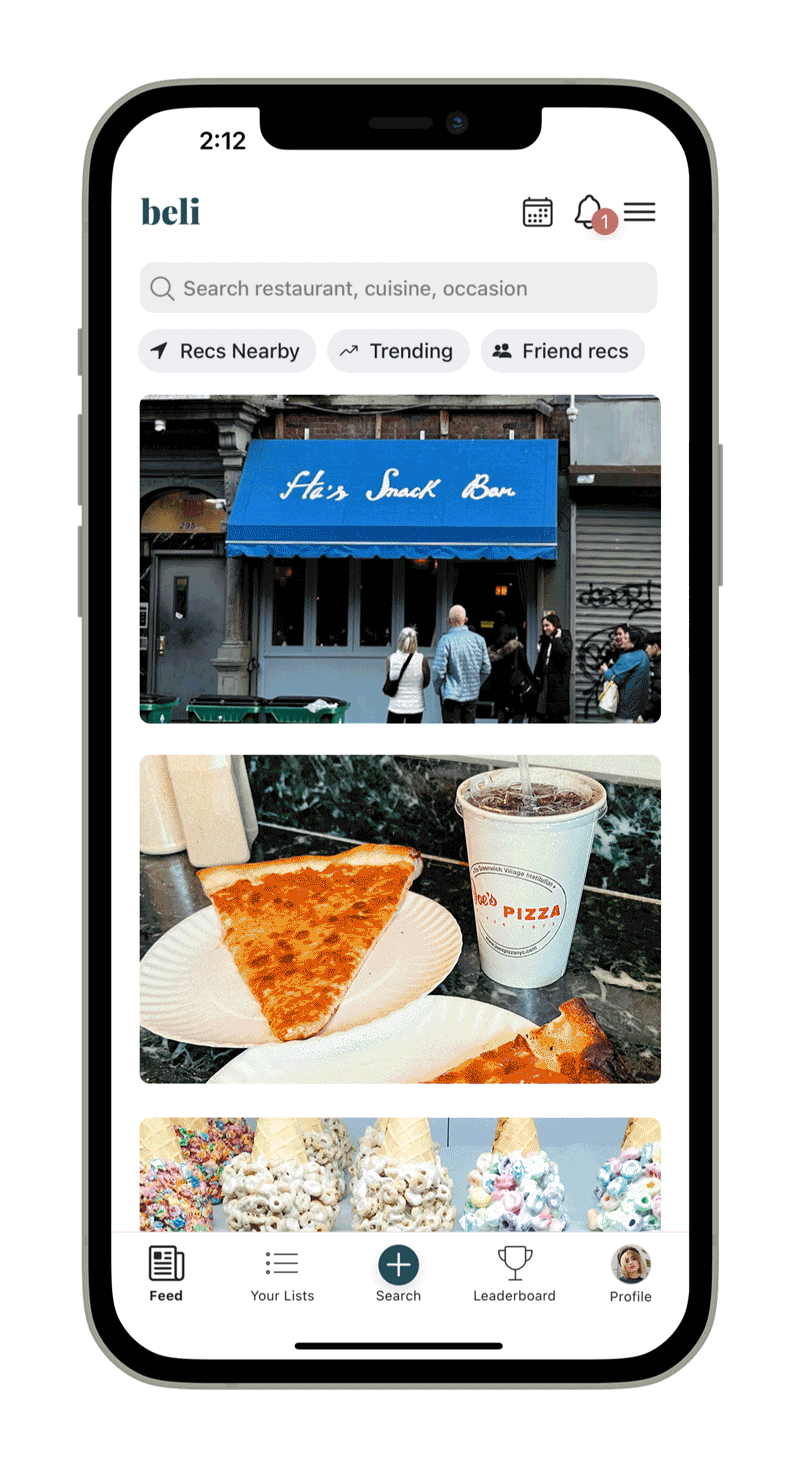
A new food review app has caught on with Gen Z, and it’s changing how they interact with the food scene.
When Julia Mancuso, a 23-year-old New York City transplant working in finance, attended a Deloitte-organized happy hour in Midtown Manhattan, she hit it off with a fellow young colleague. The two decided to stay in touch. But at the end of the night, they didn’t exchange phone numbers or Instagram handles—they added each other on Beli.
In 2025, a time of great change in the approach to online assessment of restaurants, some members of Gen Z aren’t taking advice on where to eat from Yelp reviews, neighborhood listicles, or write-ups in legacy media publications. They’re following a network of friends on a platform that meshes restaurant reviews with social media. Beli might be the most Gen Z–tailored dining-out resource yet—and you may not have heard about it.
“It sounds silly, but you can really get to know someone based on their profile and what they like to do in their free time, whether that’s trying new cocktail bars or dinner spots,” says Mancuso.
Beli is both a worldwide resource for reviews and recommendations and a social hub, turning dining out into a digitized feed of data-generated suggestions, friends’ reviews, and bookmarked spots. The platform is simple to use: After users visit a business of any kind, from an of-the-moment natural wine bar like Cellar 36 in Lower Manhattan to a Bushwick carnitas seller, they can post a review for their tight-knit circle, or the Beli public at large, to see. It also serves as a one-stop shop for users to collate all of the places on their radar—like Win Son Bakery, Smithereens, and a Jon Neidich cocktail bar—rather than letting them collect dust in their Notes app.
The app prompts a series of comparisons between new and already-visited places. Based on your ranking of a newly logged restaurant or bar—for example, you can rank Ha’s Snack Bar higher than Wu’s Wonton King and The Snail but lower than Borgo—the app generates a user’s score and tailored recommendations.
Since its launch in 2021 by cofounders Judy Thelen and Eliot Frost, who met while working at the consulting firm McKinsey & Company in 2015, Beli has become a fixture in a certain sector of New York’s dining scene. Now incoming NYU students download the app at freshman orientation. Murray Hill girls bid their bottomless brunch besties adieu with “Wait, are you on Beli?” before adding everyone around the table. Singles flex their Beli stats on Hinge profiles—“I’ll fall for you if you’ve ranked more places on Beli than me,” a profile I came across said—and some believe a questionable profile, such as one that favors basic restaurants, is a red flag.
Beli isn’t just about generating restaurant recommendations. Users often tag their dining companions and write in-depth reviews that eventually amass to a kind of food journal. The app tracks a culinary footprint for each user, producing a world map of a user’s reviewed and want-to-visit places—not unlike the interface Foursquare pioneered nearly two decades ago.
The app offers multiple methods of gaining status: referring new users, ranking more restaurants, and entering a new ranking weekly. Each of these stats is visualized on a member’s profile, and, according to several users, the app urges members to try new foods, cuisines, and neighborhoods. Beli also posts app-wide and citywide leaderboards of who has ranked the most places and frequently nudges users to keep a streak alive, similar to Duolingo.

Whether the app has the capacity to see through the scene-y, often cultureless restaurants that permeate New York remains to be seen. Atop Beli’s list of the city’s highest-rated restaurants are 4 Charles Prime Rib and Don Angie, among others—generic, unoriginal restaurants with questionable hype, expensive food, and TikTok virality. To some, Beli contributes to unmerited buzz and makes hyped reservations even more impossible to snag, rather than uplifting the unpretentious, unassuming joints that diversify a food scene.
“As a native New Yorker, something I don’t love about [Beli] is that it takes away the very integral part of New York: that the bagel shop on the corner is your bagel shop, and that’s the best,” says Emma Weseley, who returned to New York after college and still uses the app in the city. “It makes people go out of their neighborhood to get these things that maybe should be kept as more of a local thing.”
Given its structure, Beli undoubtedly reaches populations with disposable income to frequently rank new places and has the potential to generate a herd mentality palate. Its gamified algorithm can create a mindset that one place—whether it’s Joe’s Pizza for a pepperoni slice or the Corner Store for a French dip—is the place. But while Beli may seem like just another example of Gen Z’s inclination to cement real-life experiences online, some users view it as a way to capture sentimental moments.
“It’s like, ‘Ah, that restaurant is where I went on my first date with so-and-so, or that restaurant is where some friends and I just caught up and had a really great time.’ That’s the main reason I use it,” says Fashion Institute of Technology student Elisa Cose.
Users elect to set their profiles as public or private. Though Gillian Feinglass is ranked 29th-most influential on the app overall after referring more than 40 people, she likes keeping the intimacy of Beli among her friends only.
“I don’t want the implications that, let’s say, a public Yelp or Google review has,” she says. “These are my own thoughts, and I share them with my own community. I get very creative with my summaries or my thoughts on restaurants.”
“I eagerly returned to my beloved UWS ice cream haven, only to discover they’ve made the tragically misguided and undeniably foolish decision to discontinue the divine coffee brownie chip flavor,” reads Feinglass’s review for the Boston-based chain Emack & Bolio’s.
One kink Beli is trying to work through is the often-wonky ranking system. Many users dislike how it forces a comparison between restaurants with entirely different vibes or cuisines.
“How do I compare the tacos stand on the side of the road that I love with a three-Michelin-star restaurant?” says Feinglass, who now uses Beli in Washington, DC, after first downloading the app in her hometown of New York.
When cofounders Thelen and Frost explored New York’s food scene together, they had two grievances: It proved overwhelming to keep track of places to try and places they’d been, and many of the supposed best restaurants in the city didn’t suit their tastes.
“Pretty much every foodie we spoke to kept some kind of restaurant list, whether it was in their Notes app or a doc or a spreadsheet or a text thread, but there was just no central place where everybody was keeping lists together,” Frost says. They began building a solution while attending Harvard Business School.
“As a native New Yorker, something I don’t love about [Beli] is that it takes away the very integral part of New York: that the bagel shop on the corner is your bagel shop, and that’s the best.”
When Beli launched in 2021, Thelen and Frost envisioned millennials as their target audience. But they quickly realized the app was gaining traction with Gen Z, a chronically online generation that’s even more inclined to adopt new apps and digitize real-life experiences. Now, the founders say, roughly 80% of the app’s users are under 35.
Thelen attributes the app’s particular appeal to Gen Z to its launch in the wake of the COVID-19 pandemic, when college students and recent graduates felt a unique push to experience the world in person, or to explore a city to which they had recently moved. The app’s sleek design and algorithmic recommendations package reviews and recommendations for a younger audience. Unlike apps like Instagram or X that offer users an endless stream of content, Beli’s abbreviated feed of food suggestions and friends’ reviews doesn’t prompt doomscrolling.
After first catching on in New York City, the app’s popularity quickly expanded across the United States. Now it has over 60 million global reviews, surpassing Yelp, and 10% of its user base is international. New York remains the app’s biggest hub, with Chicago a close second. The founders declined to provide daily active user data, a key metric in app performance.
On a recent sunny Wednesday, I walked to the Union Square Greenmarket, and in my first ten paces, I spotted a group of girls clad in mini cardigans, chunky sunglasses, and pleated skirts who turned out to be first-year students at Northeastern University visiting the city from Boston on spring break. Two of them, Katy Choi and Nicole Messer, chose every bite they took during their trip to the city using friends’ reviews on Beli, and, during each meal, they reminded each other to snap pictures of their food before documenting it in the app.
“I found my top three eats on my Beli in New York,” says Choi, whose eyebrows jumped from behind her shades when I asked if she knew anything about an app called Beli. “I have a friend who’s in New York, and I looked at a lot of her reviews to decide where I wanted to go, and I feel like it hasn’t really done me dirty.”
Though the app coaxes users into chasing the highest-quality food in their area—which can sometimes come from stale, overhyped spots—some users find that their favorite experiences consist of more than just a good dish. Elya Rak, a first-year student at NYU, lets the sentimental aspect of each meal inform her review.
“My highest rankings on Beli are the dinners I’ve had with friends where none of us touched our phones,” says Rak. But once the check is paid, users almost always fish their phones out from their pockets to log the meal.